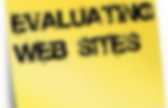

Save The Pacific Northwest Tree Octopus. Help Save The ENDANGERED From EXTINCTION!
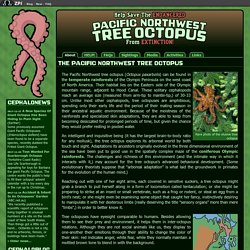
The Pacific Northwest Tree Octopus Rare photo of the elusive tree octopus The Pacific Northwest tree octopus (Octopus paxarbolis) can be found in the temperate rainforests of the Olympic Peninsula on the west coast of North America. Their habitat lies on the Eastern side of the Olympic mountain range, adjacent to Hood Canal. An intelligent and inquisitive being (it has the largest brain-to-body ratio for any mollusk), the tree octopus explores its arboreal world by both touch and sight.
Map of estimated tree octopus maximum range, including spawning waters Tree octopuses have eyesight comparable to humans. Points to remember! Reminder of why you can't believe everything on the Internet!! How To Evaluate a Website. The Web has become the go-to source for many people doing all sorts of research these days.
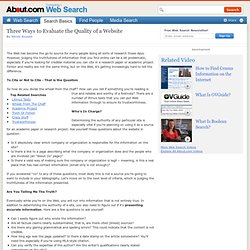
However, judging the truthfulness of information that you find online can be a bit problematic, especially if you’re looking for credible material you can cite in a research paper or academic project. Fiction and reality are not the same thing, but on the Web, it’s getting increasingly hard to tell the difference. To Cite or Not to Cite - That is the Question So how do you divide the wheat from the chaff? How can you tell if something you’re reading is true and reliable and worthy of a footnote? Who’s In Charge? Determining the authority of any particular site is especially vital if you’re planning on using it as a source for an academic paper or research project. Are You Telling Me The Truth? Eventually while you're on the Web, you will run into information that is not entirely true. Can I easily figure out who wrote the information?
Are You Selling Me Something? It's Just Common Sense. Evaluation Criteria from "The Good, The Bad & The Ugly: or, Why It's a Good Idea to Evaluate Web Sources" Evaluating Web Pages: Techniques to Apply & Questions to Ask. 1.
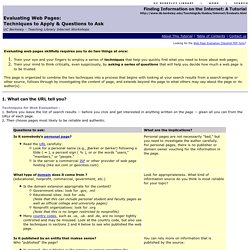
What can the URL tell you? Techniques for Web Evaluation : 1. Before you leave the list of search results -- before you click and get interested in anything written on the page -- glean all you can from the URLs of each page. 2. 2. 1. INSTRUCTIONS for Truncating back a URL: In the top Location Box, delete the end characters of the URL stopping just before each / (leave the slash). Continue this process, one slash (/) at a time, until you reach the first single / which is preceded by the domain name portion. 3. Check the date on all the pages on the site. 3. 1. What kinds of publications or sites are they? Are they real? 3. Expect a journal article, newspaper article, and some other publications that are recent to come from the original publisher IF the publication is available on the web. Look at the bottom of such articles for copyright information or permissions to reproduce. 4. 1. A.
Type or paste the URL into alexa.com's search box. Website to practice evaluating! Can I trust this website? by Sheridan Library on Prezi. More websites regarding evaluating websites! Evaluating Web Sources § Harvard Guide to Using Sources. Although you should generally begin your electronic research by using e-resources available through the Harvard Library, there may be times when you will want to use popular Web search engines like Google.
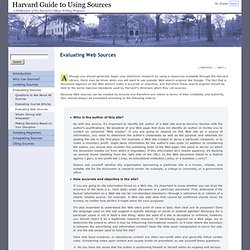
The fact that a document appears on the Web doesn't make it accurate or objective, and therefore these search engines should be held to the same rigorous standards used by Harvard's librarians when they vet sources. Because Web sources can be created by anyone and therefore are riskier in terms of their credibility and authority, they should always be evaluated according to the following criteria: Who is the author of this site? As with any source, it's important to identify the author of a Web site and to become familiar with the author's qualifications. Be skeptical of any Web page that does not identify an author or invites you to contact an unnamed "Web master. " What's Wrong with Wikipedia? § Harvard Guide to Using Sources. There's nothing more convenient than Wikipedia if you're looking for some quick information, and when the stakes are low (you need a piece of information to settle a bet with your roommate, or you want to get a basic sense of what something means before starting more in-depth research), you may get what you need from Wikipedia.
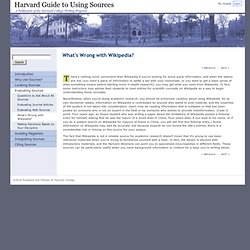
In fact, some instructors may advise their students to read entries for scientific concepts on Wikipedia as a way to begin understanding those concepts. Nevertheless, when you're doing academic research, you should be extremely cautious about using Wikipedia. As its own disclaimer states, information on Wikipedia is contributed by anyone who wants to post material, and the expertise of the posters is not taken into consideration. Users may be reading information that is outdated or that has been posted by someone who is not an expert in the field or by someone who wishes to provide misinformation.